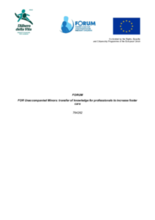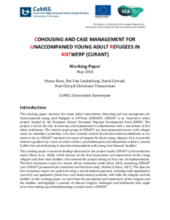Displaying 31 - 40 of 58
This article is written as part of the FORUM project (FOR Unaccompanied Minors: transfer of knowledge for professionals to increase foster care), an EU funded project which sought to enhance the capacity of professionals to provide quality foster care for unaccompanied migrant children, primarily through the transfer of knowledge. The article aims to contribute to this transfer of knowledge by bringing together literature which is of relevance to professionals developing or enhancing foster care services for unaccompanied migrant children.
In this study, concept mapping was used to identify the needs of nonkinship foster parents from Caucasian ethnicity who care for unaccompanied refugee minors (URM) in Flanders (Dutch speaking part of Belgium).
On 15 November, care leavers and young people in Europe shared their recommendations with more than 60 representatives of governments, NGOs, youth welfare services and universities at the final project roundtable in Brussels.
This paper focuses on youngsters’ experiences of continuity in relation to youth-care services.
This working paper is based on findings discussed in the project report CURANT: a first evaluation report (Ravn et al., 2018), which focuses on the first impressions and experiences of the young refugees and their local buddies, who entered the project during its first year of implementation.
Drawing upon in‐depth interviews with 12 parents of adolescent girls with multiple and complex needs in residential child welfare, this exploratory study describes parents' own needs and preferences with regard to care delivery.
This study aims to facilitate further identification of the consequences of parental burnout for the parents themselves, their spouses and their child(ren).
Based on an analysis of the evolutions in the way the care structures for unaccompanied minors were set up in Belgium, the authors of this article critically reflect on the underlying rationales that justify the particularities of these structures, hereby also reflecting about the implications of these rationales for professionals and researchers.
Save the date for the Opening Doors for Europe’s Children event “Maintain, Strengthen, Expand: How the EU can support the transition from institutional to family and community-based care in the next MFF”
The 2017 country factsheets provide an update on the status of child protection and care reforms from 16 European countries that are the focus of Opening Doors for Europe’s Children campaign in Phase II.


